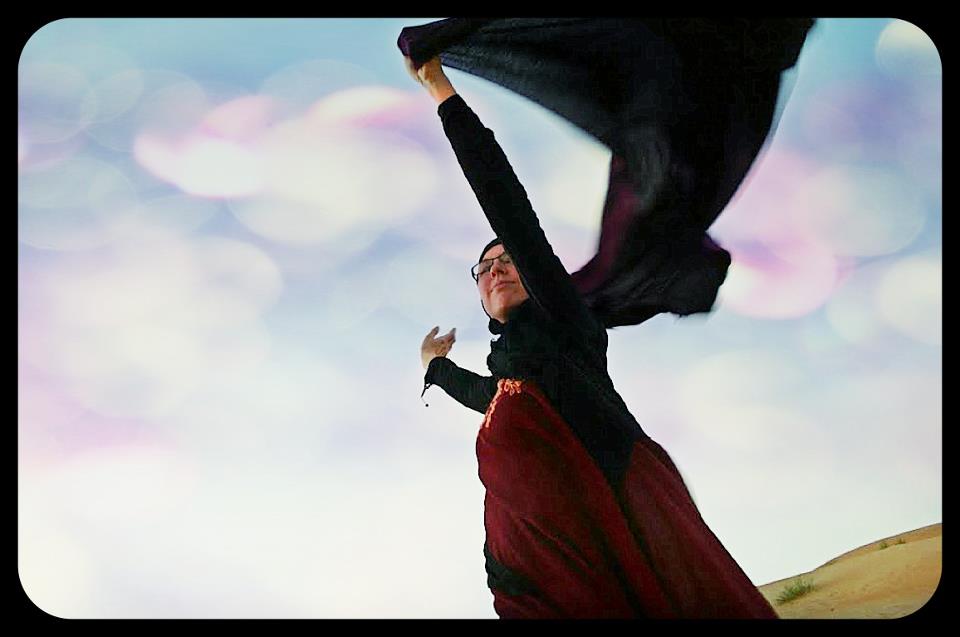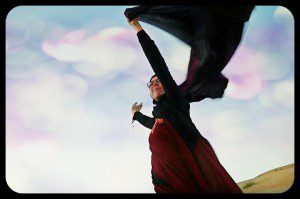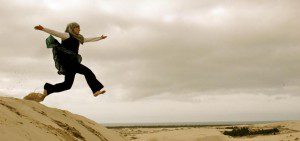Jaye Starr discusses how she combines her Muslim faith with social justice, humanitarian work, theater and the circus.
Tell me how you got started.
I don’t recall a point when I “got started,” but there I was greatly influenced by three books I read as a child: Sadako and the Thousand Paper Cranes, Alicia: My Story, and Zlata’s Diary. Each shares a tragic story of life and death: Sadako’s story unfolds in Hiroshima as bomb-induced leukemia takes her from this world, Alicia’s as she miraculously survives the Holocaust/Shoah traveling on foot from Poland, and Zlata as she withstands the siege of Sarajevo. These tragically true stories awoke in me an awareness of the bitter realities of war, but also of the contributions individuals could make to peace-building – both for the individual and the society.
What interests you most about what you’re doing now?
Right now I am unbelievably excited about being back in school! I’m striving to build a solid foundation for the community and individual-level peace building I am dedicating the rest of my life to. After working in various parts of the field for a decade, I’ve got a good grasp on what I don’t know but would really like to learn – namely the tools of chaplaincy. I’m blessed to have the opportunity to immerse myself in learning and I hope to pay it forward in service to humanity. I’m pursing an MA in Islamic Studies with a concentration in Muslim-Christian Relations as well as a Graduate Certificate in Chaplaincy. While it might not seem related, it builds on my background in social justice movements, humanitarian work, theater and circus. My intent is twofold: first I’d like to help bridge the gap between psychological first aid providers and the Muslim communities they are often serving. Secondly I’d like to help alleviate some of the burden carried in the hearts of people living in the US who have been impacted by armed conflict and natural disaster by combining the skills of chaplaincy with theatrical and visual arts.
What’s been your biggest accomplishment? Biggest challenge?
I think they are one in the same: I’ve worked almost entirely for small understaffed non-profits and I’ve only been properly trained to do one position – incidentally, it was a three month interim administrative role. Everything else I’ve largely had to figure out on my own. That I’ve generally been able to do it successfully is an accomplishment, but it speaks to a tragic challenge faced by civil society. Our failure to train, mentor and support those around us is preventing us from taking full advantage of the extraordinary capacity that we have. I feel that I’ve lost a lot of time over the years going in circles rather than building on best-practices and past lessons. Now, when I start anything I try to figure out everything that has been done prior to my arrival before moving forward.
The testament of faith in Islam is called the shahādah. Lately I’ve been ruminating on the idea of living my shahādah “out loud.” The idea is that our shahādah is not just something that we say and believe, but that we live. For me this action builds on a major focal point of Islam: tawḥīd (توحيد ) – or the oneness of God which some understand as the unity of creation. I believe that to fully respect the oneness we need to live life in a manner that recognizes the intimacy of this connection. To work for the wellbeing of each person is deeply linked to my sense of what it means to live my shahādah out loud. Also central to this is humanity’s calling from God to serve as vicegerents on Earth (Qur’an Chapter 2 Verse 30). I find in this the obligation to care for the earth’s abundant resources and creatures as I care for the people upon it.
Why is peace sexy to you? What does “Peace is Sexy” evoke for you?
I’ve spent an insane amount of time thinking about this and the best answer that I can come up with is that, just as sex is necessary for humanity to survive, peace is as well. And seriously, wouldn’t everyone enjoy sex more if the world were more peaceful?
What is a simple thing you do to create peace? What is something you do everyday?
Earlier I spoke about how the principle of tawḥīd inspires me to live my shahādah out loud. That commitment manifests itself daily in my life through some of the most mundane tasks. Stopping to pick up trash, recycling, seeking out organic produce, and carrying my own silverware, travel mug, and towel for when I make my prayer ablutions are ways of respecting tawḥīd and my human role as a vicegerent of the earth. Advocating economic policies at the state, federal and international levels recognize God’s commands for building justice. Calling my Congressional representatives to request that they stop supporting the sale of weapons to governments with known abuses of human rights records and engaging in inter-faith action, purchasing fair trade products, and treating people with compassion are all acts of living my shahādah out loud.
How would you like Peace is Sexy to make a difference in what you are up to?
The “sexiness” attributed to violence and warfare in the media and entertainment fields is simply disgusting. I look forward to the role that Peace is Sexy can play in the creation of a counter narrative. I dream of a day when people opt to care about what needs to be done in their community and when, in looking for a life partner, they become more concerned with the contributions someone has made to the world than their clothing, fast car or big bank account.
Where would you like to see your passion go in the next 10 years? 20 years? 100 years?
Lao-Tse wrote of peace at the individual level providing the foundation for peace at the global level. My dream is to help provide the foundation blocks for communities. I’d like to do this by combining my background in theater with my current chaplaincy studies to help bring peace to individuals impacted by disaster and armed conflict. My hope is to enable people to share their stories as a means of redistributing and sharing the burdens they carry from their experiences. Just as the three books I mentioned above have helped to create change in society, I hope to empower others to do the same along the way.
I am also interested in contributing my knowledge of Islam to the growing physiological first aid movement. I’d like to enable tools within the faith to contribute to peace for impacted Muslim individuals and communities and to help change people’s views of it as “the source of problems” to a source of solutions.
Is there anything else you want to tell us?
Y’all are a bunch of sexy peace building rock stars – thanks for the work you are doing!



